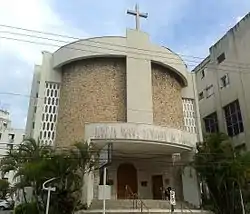Lebanese Brazilians
Lebanese Brazilians (Portuguese: Líbano-brasileiros), (Arabic: البرازيلي اللبناني) are Brazilians of full, partial, or predominantly Lebanese ancestry, or Lebanese-born immigrants in Brazil. Until 1922, Levantine immigrants were considered "Turks", as they carried passports issued by the Turkish Ottoman Empire, which then ruled over present-day Lebanon.[4]
| Total population | |
|---|---|
| The Brazilian/Lebanese governments claim there are 6-7 million Brazilians of Lebanese descent.[1][2] However, another study, covering only the states of Amazonas, Paraíba, São Paulo, Rio Grande do Sul, Mato Grosso and Distrito Federal, found less than 1 million Brazilians of any Middle-Eastern ancestry.[3] | |
| Regions with significant populations | |
| Brazil: Mainly in São Paulo State, Minas Gerais, Goiás, Rio de Janeiro, Paraná, Ceará , Bahia, Amazonas, Pernambuco , Maranhão , Piauí. | |
| Languages | |
| Brazilian Portuguese, Lebanese Arabic | |
| Religion | |
| Roman Catholicism 65%, Eastern Orthodox Church 30%, Shia Islam, Sunni Islam, Druze 5% | |
| Related ethnic groups | |
| Other Arab Brazilians |
| Part of a series of articles on |
| Lebanese people |
|---|
 |
|
|
The population of Brazil of either full or partial Lebanese descent is estimated by the Brazilian and Lebanese governments to be around 7 million people.[1][2] According to a research conducted by IBGE in 2008, covering only the states of Amazonas, Paraíba, São Paulo, Rio Grande do Sul, Mato Grosso, and Distrito Federal, 0.9% of white Brazilian respondents said they had family origins in the Middle East.[3] If the first figure is correct (7 million), this number of descendants is larger than the population in Lebanon. However, other Middle Eastern countries such as Syria, Iraq, Jordan, and Palestine also contributed immigrants to Brazil, and nowadays, most of their descendants are of only partial Middle Eastern ancestry.
Immigration of the Lebanese (and Syrians) to Brazil started in the late 19th century, most of them coming from Lebanon and later from Syria. The immigration to Brazil grew further in the 20th century, and was concentrated in the state of São Paulo, but also extended to Minas Gerais, Goiás, Rio de Janeiro, and other parts of Brazil.
Between 1884 and 1933, 130,000 Lebanese people entered Brazil through the Port of Santos—65% of them were Catholics (Maronite Catholics and Melkite Catholics), 20% were Eastern Orthodox, 10% were Muslims (Shia, Sunni), and about 5% were Druze. According to French Consulate reports from that time,[5] Lebanese/Syrian immigrants in São Paulo and Santos were 130,000, in Pará 20,000, Rio de Janeiro 15,000, Rio Grande do Sul 14,000, and in Bahia 12,000. During the Lebanese Civil War (1975–90), around 32,000 Lebanese people immigrated to Brazil.
Although the exact number of Lebanese Brazilians is disputed it is believed by some that there are at least 6 million Brazilians of Lebanese origin.[6] Despite being estimated at less than 4% of the population of the country, descendants of Lebanese immigrants occupied 10% of the parliament seats in 2014[6] and 8% in 2015.[7][8]
Lebanese culture has influenced many aspects of Brazil's culture. In big towns of Brazil it is easy to find restaurants of Lebanese food, and dishes, such as sfiha ("esfiha"), hummus, kibbeh ("quibe"), tahina, tabbouleh ("tabule") and halwa are very well known among Brazilians.
Most Lebanese immigrants in Brazil have worked as traders who sell textiles and clothes and open new markets. Lebanese-Brazilians are well-integrated into Brazilian society.
 The Hospital Sírio-Libanês (Syrian-Lebanese Hospital) founded by the Lebanese Community in 1931 in São Paulo.
The Hospital Sírio-Libanês (Syrian-Lebanese Hospital) founded by the Lebanese Community in 1931 in São Paulo. Igreja Ortodoxa São Jorge de Brasília (St. George Eastern Orthodox Church) located in Brasília.
Igreja Ortodoxa São Jorge de Brasília (St. George Eastern Orthodox Church) located in Brasília. Our Lady of Lebanon Maronite Catholic Cathedral, São Paulo
Our Lady of Lebanon Maronite Catholic Cathedral, São Paulo
Notable Lebanese Brazilians
Please see List of Lebanese people in Brazil
See also
References
- "Brazilian Ministry of Foreign Affaires". Archived from the original on 2015-09-23. Retrieved 2015-09-22.
- "Archived copy". Archived from the original on 2010-11-12. Retrieved 2011-07-04.CS1 maint: archived copy as title (link)
- IBGE: Características Étnico-Raciais da População Archived 2013-09-03 at the Wayback Machine
- Recopilaron casi 200 años de los sirio libaneses en Argentina Archived 2014-09-08 at the Wayback Machine
- Lesser, Jeff (1999). Negotiating National Identity: Immigrants, Minorities, and the Struggle for Ethnicity in Brazil. Duke University Press. ISBN 978-0-8223-2292-4.
- Joe Dyke, "How the Lebanese conquered Brazil - Success came through hard work and perseverance", Executive Magazine, July 3, 2014
- Carvalho, Viviane. "Interview With The Ambassador of Brazil to Lebanon". Home For Lebanon. Retrieved 7 February 2016.
- Bercito, Diogo. "No Congresso, 8% dos parlamentares têm origem libanesa". Folha de S. Paulo. Retrieved 7 February 2016.
External links
| Wikimedia Commons has media related to Lebanese diaspora in Brazil. |